The Outer Worlds review: A stellar argument for deeper games, not wider ones - carvajalyoughtley
Half an time of day intoThe Outer Worlds, someone criticized my fashion gumption. Thawed out from collection stasis and thrown and twisted into the crumbling hypercapitalist incubus that is the Halcyon Colony, I of course did the standard role-playing game thing: Ditched my newspaper publisher-thin clothing for the first beefy set of armor I could "take up" off a stone-dead foe. Marauder armor, equally it turned down.
And then the first civilized human being I ran into called me thereon. "You uh…you may not lack to wear that armor around here, lest people think you'ray a marauder yourself. I'm pretty raw-minded, but…"
My jaw dropped. Sufficiently corrected, I switched aft into my civilian dress and only wore clean and corporate-companionate space armor for the next 25 hours. Lesson well-read.
Storm response
On that point's a famous Warren Spector thought experiment, the "One Block Role-Acting Game." In it, Spector puts Forth River the idea of an immoderate-compact simulation, a dense but meticulously detailed know that inhabits solitary a single city occlude. IT's a fascinating conception, essentially the antithesis of most modern games.
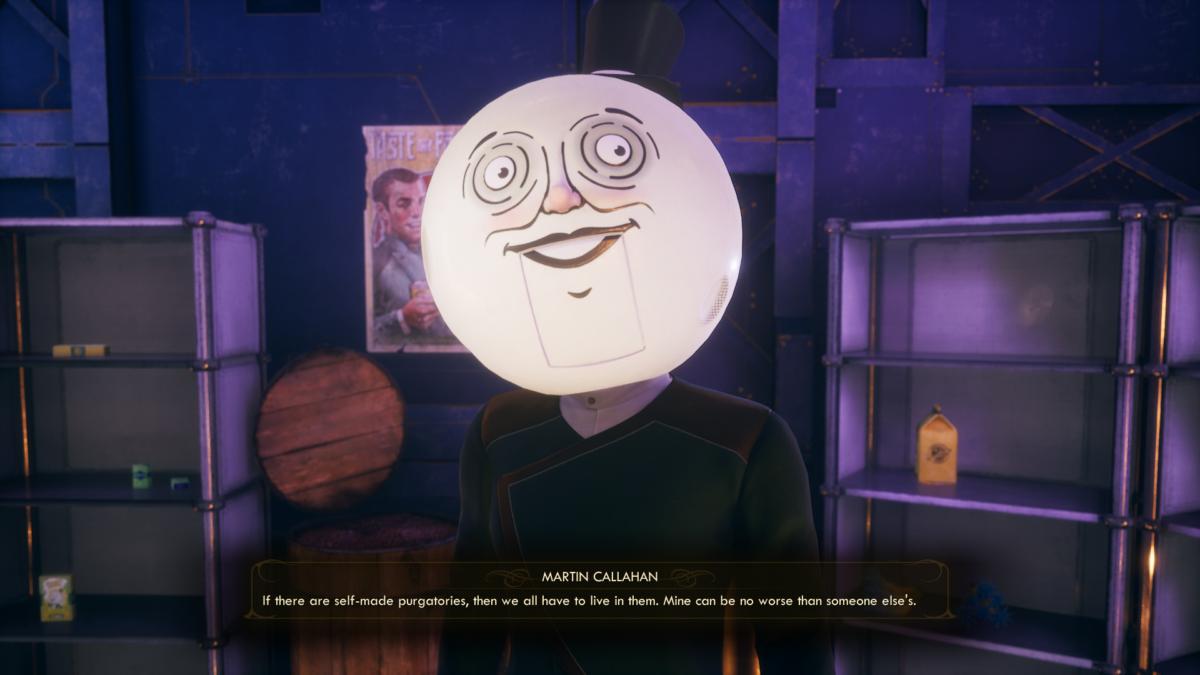 IDG / Hayden Dingman
IDG / Hayden Dingman I'm certainly not going away to say thatThe Outer Worlds is Spector's visual sense made reality. IT's not. But I bring it up because the key to the "One Parry" dream is depth. Preferably than spreading the same fractional-realized mechanics over always-larger environs, Spector postulates that in that respect's an alternative path games could take, small merely more reactive.
And it's this latter near that informedThe Outer Worlds. Again, we're yet far from Spector's ideal, butThe Outer Worlds is nevertheless an interesting contrast to other RPGs of this generation, especiallyFallout 4. It's a repudiation of the 100-hour Holy Grail, of the long-standing belief thatmore equalsbetter, and that every player necessarily to see everything.
It's hardly the first to subvert that doctrine, course. Inkle's intact Ink railway locomotive is well-stacked around lots of midget choices that aggregate into larger story branches (reckon Heaven's Vault), and I just brought up the same phenomenon last hebdomad when discussingDisco Elysium.
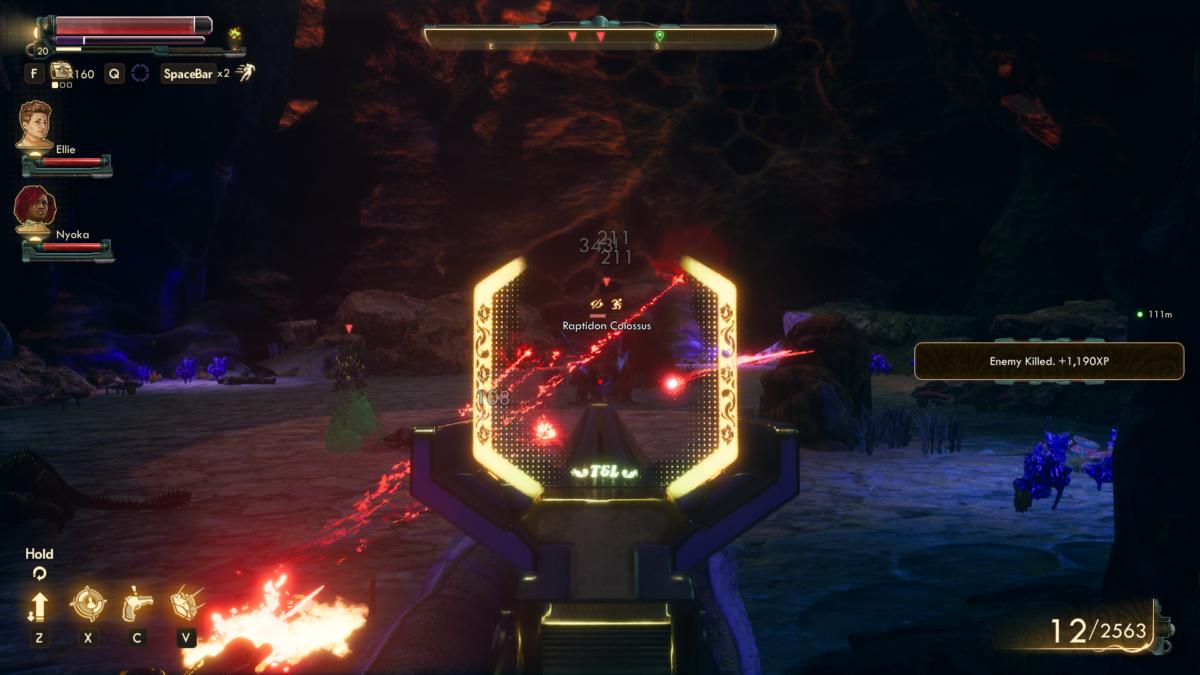 IDG / Hayden Dingman
IDG / Hayden Dingman Obsidian gets to explore these ideas in the garb of a traditional Bethesda-fashio RPG though. When we sawThe Outside Worlds at E3, I said it looked more likeFallout: Late Vegas than I expected. And that still holds straight! It's a space-age take on the 1950s, and leans many into the anti-capitalist rhetoric than Bethesda-eraFallout, but otherwiseThe Outer Worlds consciously mimics theNew Vegas aesthetic, from the way dialogue trees are presented to the fact you dismiss slacken time in scrap. There's nothing subtle more or less information technology.
But it'sFreshly Vegas decade years later, and with the lessons Obsidian learned fromPillars of Eternity andTyranny. It'sUntested Vegas, but with smaller maps and more focus. It'sNew Vegas, except there are dozens of skill checks littered passim all conversation, and more rewards for role-playing nonviolent characters. Hell, I bypassed the entire final stamp encounter aside investment in hacking and lockpicking for the integral halt.
Put simply,The Outer Worlds is a third as long American Samoa most modern RPGs, merely with three times the depth. That's some rough math—by which I signify, completely invented. But you get the estimate.The Outer Worlds is "only" 20 to 30 hours long, but that relatively tight scope belies a significant amount of histrion freedom.
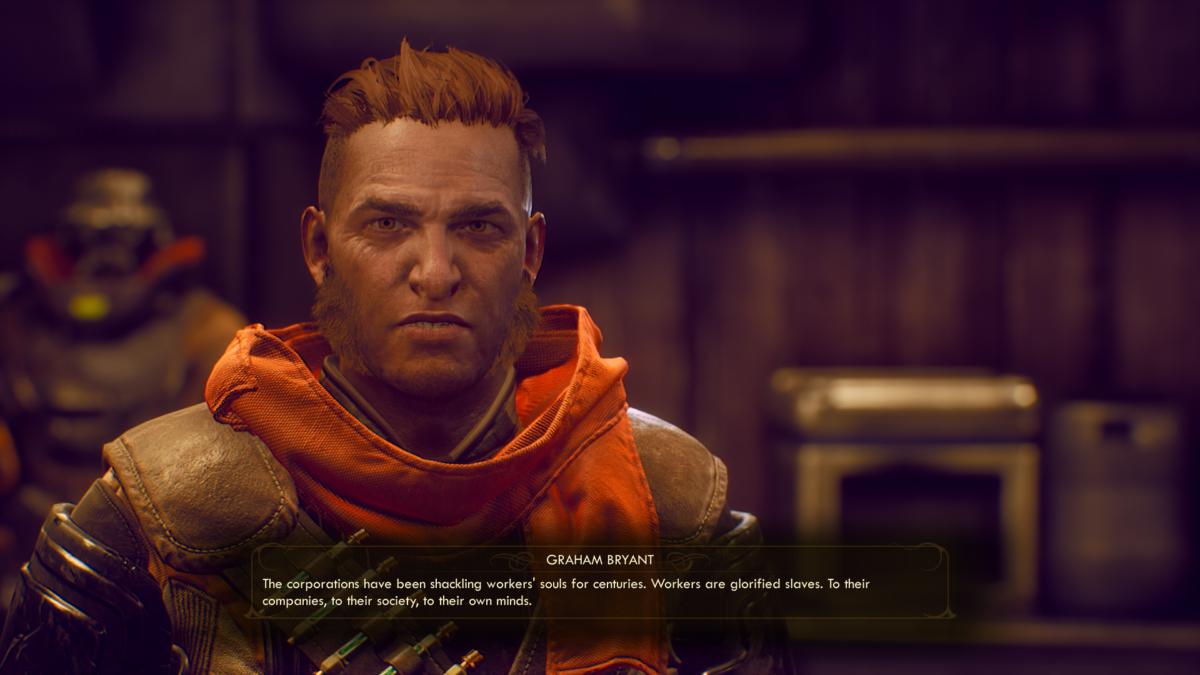 IDG / Hayden Dingman
IDG / Hayden Dingman So much freedom, you can derail the story almost immediately. The person World Health Organization released you from stasis at the beginning, a certain Dr. Phineas Welles? He's a famous turncoat, and you ass walk in the lead to the first law enforcement you see and…spell him in.
How does that play out? I wear't know, because I'm non an asshole. But the point is youcan do it.The External Worlds empowers the player to make choices that other games preceptor't, which no doubt created a ton of work along Obsidian's part but feels improbably rewarding in practise. It's good to feel like your lineament is supported past the fiction, a freedom you unremarkably pay off from tabletop persona-acting merely rarely digital.
The Outer Worlds has a remarkable electrical capacity to surprise you, as well. I already narrated the armor anecdote higher up, just information technology's exactly one of many instances where I completed Obsidian had foreseen a course of action and preemptively reacted to it. All game has a few, butThe Outer Worlds is chock full. Make a smart character, you'll see in hand dialogue options. Reach a character withunderslung intelligence, you'll see equitable as many—or maybe Sir Thomas More.
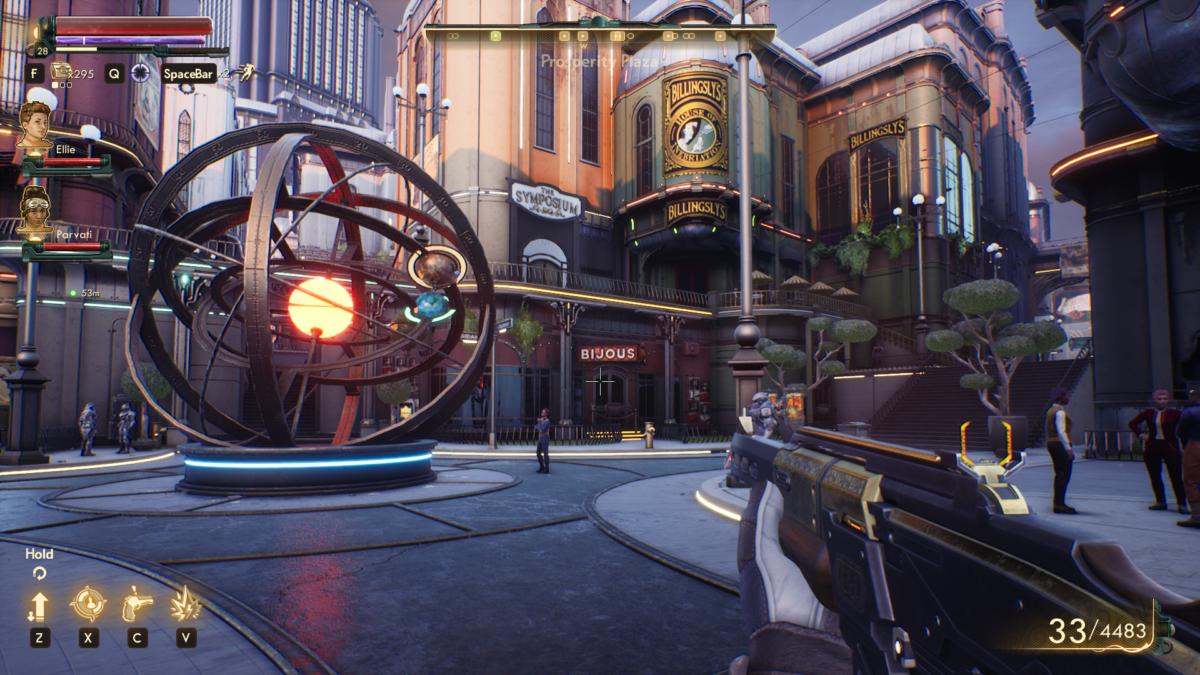 IDG / Hayden Dingman
IDG / Hayden Dingman Another great example: A little Sir Thomas More than halfway through with the game, peerless of your companions expresses a desire to reconnect with her family. They've been alienated for years, and she wants you to tag along and establish her seem like a badass adventurer ahead of her folks. I North Korean won't spoil the specifics, but her parents are jerks and the meeting goes sour.
So I stroke them.
I expected her to respond, sure, but themanner she reacted felt more realistic than I expected. She said something like "Hey, I didn't like how things went down either, but did you get to go and kill them?" In some other words, she reacted to the specific fortune close. And sure, information technology's perhaps non hard for Obsidian to predict that the player might mutilate these two characters after talking to them and plan accordingly—but many gameswouldn't.
That's what makesThe Outer Worlds interesting, I think. With fewer quests and a tighter focus, Obsidian was able to spec out all sorts of strange edge cases that wouldn't make the cut in former games, make up it for budget reasons, or time, surgery et cetera.
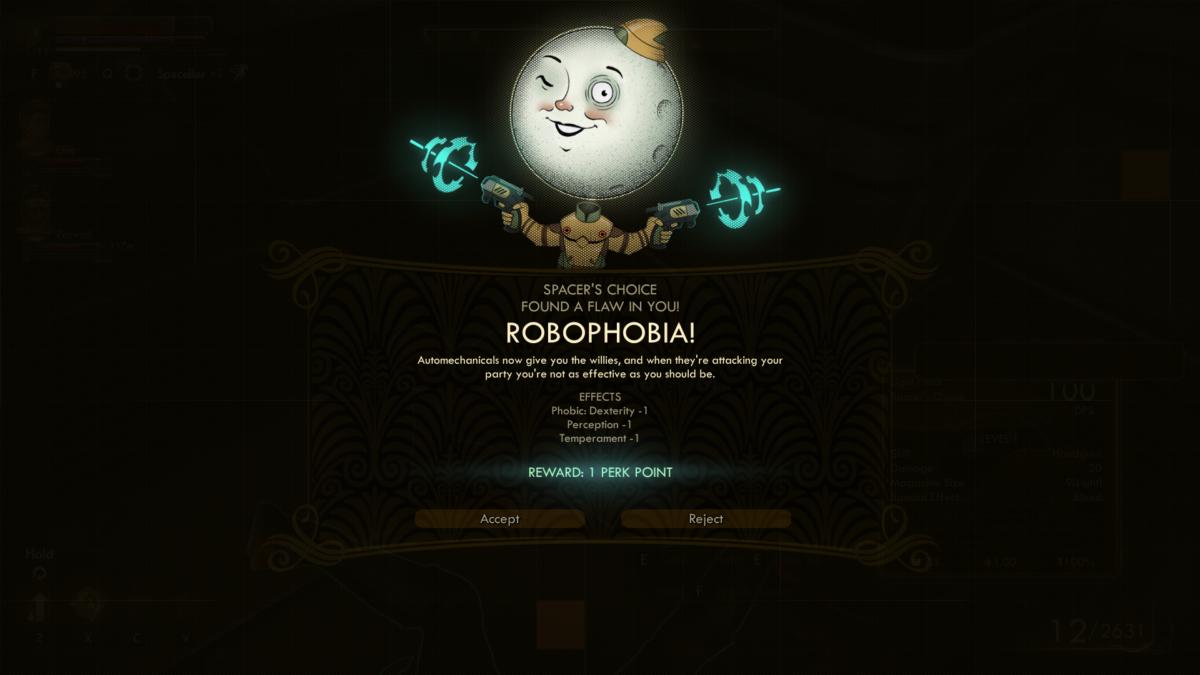 IDG / Hayden Dingman
IDG / Hayden Dingman "Flaws" contribute to this touch as well, albeit in a more mechanized way. Throughout the game you'll be presented with the option to take negative traits in exchange for more than perk points. Take a lot of damage from plasma weapons for instance, and you hind end earn a permanent weakness to them—if you want. It's like the reciprocal ofThe Elder Scrolls and its "The more you employment a science, the improve it gets" leveling system. Present, the more you spoil the more you're prone to fail in the future, a calculated risk of exposure that's commencement by gaining much powerful perks. The system could stand to be more creative, arsenic virtually flaws are just "Take more damage from certain sources." It's another way in which the world feeds into your character though, which I appreciated.
That aforesaid,The Outer Worlds is still aFallout-style game and the interstitial tissue is underwhelming. For all the depth Obsidian's built into its story beat generation, wandering the world is tranquilize remarkably frictionless. You can steal practically anything with goose egg consequences, walk of life into hit-or-miss homes without notice. The inventory system is a muss, and stores are functionally meaningless. Secondary characters are canonized seeking dispensers, and have nothing to offer once they've fulfilled their purpose. Locations too are wrung KO'd so discarded.
Worst of all in a game this reactive: Change is described, but never really manifests. At least, not to the extent you'd want. The first major planet you inflict will parade some surface-level differences depending on which sect you prefer to support, simply they feel canned and sterile—and that's thebest suit scenario. Later choices won't seem in-game at all, only manifesting in the pre-credits slideshow at the end.
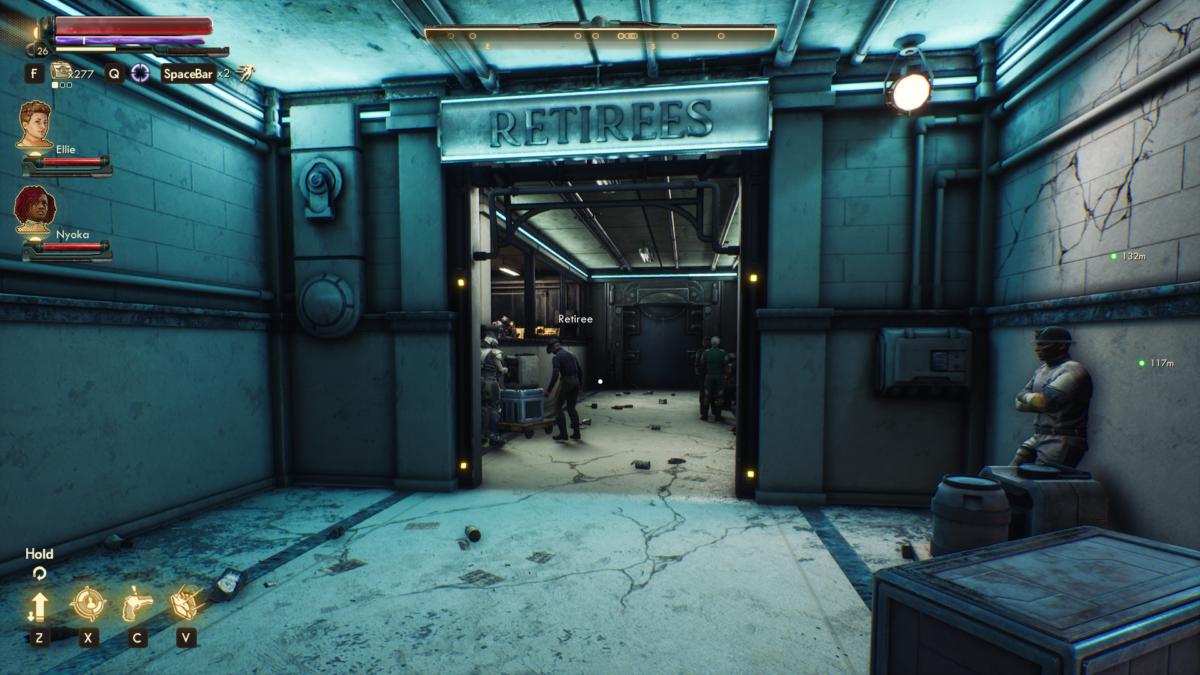 IDG / Hayden Dingman
IDG / Hayden Dingman The Outer Worlds is hardly alone in this regard, but it's a celebrated defect presumption how many choices Obsidian has you make. I wasn't exactly expectingDying Light II levels of reactivity here, but a few more signs of the player's presence would've gone a long way.
IT's the uncanny vale though, right? The more Obsidian works to minimize ruse in certain parts of the stake, the more obvious it seems in others.
Rump line
I desire Obsidian gets to make many games likeThe Satellite Worlds. That's my briny takeaway, when all's said and done. I have intercoursePillars of Eternity, don't develop me wrong. I neediness Obsidian to keep fashioning bittie isometric games as well. But real few studios get the chance to make RPGs of this sort, and evening fewer do them justice.The Outer Worlds isn't equally fresh-feeling Eastern SamoaFallout: Unexampled Vegas was circa 2010, but information technology does demonstrate once again that Obsidian approaches its worlds and its stories with much care than most developers. Better caseful scenario, Microsoft's support allows for numerous more games of this sized, even denser and more detailed.
And peradventur other studios will take note too. This generation's been one of extremes, where even serial publication likeAssassin's Creed have ballooned out to enormous sizes once reserved for the grandest of epics.The Outer Worlds proves there's unruffled value in the 20 to 30 60 minutes RPG, that on that point are more ways for this industriousness to grow than outwards.
Source: https://www.pcworld.com/article/398268/the-outer-worlds-review.html
Posted by: carvajalyoughtley.blogspot.com


0 Response to "The Outer Worlds review: A stellar argument for deeper games, not wider ones - carvajalyoughtley"
Post a Comment